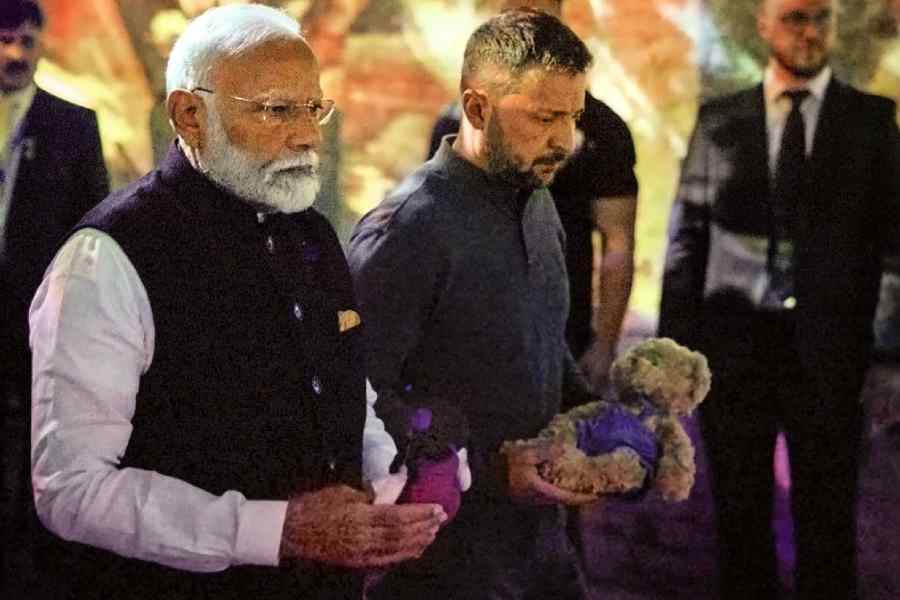As the prime minister, Narendra Modi, wound up his brief visit to Ukraine last week, India’s foreign minister, S. Jaishankar, faced journalists for a short press briefing. Asked about Modi’s trip to Russia in July and the hug he gave President Vladimir Putin in Moscow amid global outrage over a missile strike on a Ukrainian children’s hospital, Jaishankar suggested that the reporter just didn’t understand India.
“[Y]ou know, in our part of the world, when people meet people, they are given to embracing each other. It may not be part of your culture, but I assure you it’s part of ours,” he said, in a put-down that is in keeping with the career diplomat’s style.
“[I]n fact, today I think I saw the Prime Minister also embrace President Zelensky, and I’ve seen him do it with a number of other leaders in a number of other places,” Jaishankar added, referring to the Ukrainian president, before describing the question as a reflection of a “cultural gap here in terms of what these courtesies mean”. In essence, Jaishankar was saying that a hug from Modi doesn’t really mean any special affection for the person at the receiving end of the embrace.
Within a few hours, Zelensky, the latest victim of Modi’s hug, went a step further. The Indian prime minister’s visit to Kyiv, although historic, didn’t mean much to the Ukrainian leader’s efforts to secure the sovereignty of his country from Russia, he indicated. Through a series of blunt barbs delivered during an almost informal chat with Indian journalists after Modi had left Ukraine, Zelensky drilled holes in New Delhi’s assertion that it wanted to do everything in its power to secure peace between Moscow and Kyiv.
India could stop buying copious volumes of Russian oil, Zelensky said. That would deprive the Russian economy of the revenue it needs to finance the war. New Delhi could stop believing Putin, Zelensky suggested, accusing the Russian leader of disrespecting Modi by targeting the Ukrainian hospital while the Indian prime minister was in Kyiv. New Delhi, Zelensky added, could host a peace summit on the war, but went on to say that Ukraine would only want countries that had signed a Kyiv-led peace document at a June conclave to shepherd such an initiative.
Then came the most brutal hit of all: Modi had denied the allegation that India was neutral in the war and said that New Delhi was firmly on the side of peace. Zelensky wasn’t convinced. Ukraine, he said, needed India on its side, not “balancing” between Moscow and Kyiv.
Since returning to India, Modi has spoken to the president of the United States of America, Joe Biden, and Putin. Biden, according to the US, “commended” Modi for his Ukraine visit — the first ever by an Indian prime minister since the breakup of the Soviet Union. According to the Kremlin’s readout, Modi told Putin he was ready to visit Russia for a second time in the year for the BRICS Summit in October.
To be sure, there is good news in all of this for India: both Washington and Moscow remain close friends, with no bridge damaged by Modi’s recent diplomatic travels. What has been hurt, however, is the notion peddled by the Modi government that it has turned India into a meaningful — even decisive — actor in affairs of the world beyond those that directly impact New Delhi.
India remains a consummate tightrope walker, and that is to the credit of generations of world-class diplomats who have shaped and finessed the country’s foreign policy. But despite their brilliance, acrobats are rarely ringmasters. Usually, someone else runs the show. That’s true in a circus and in geopolitics. Those who need showrunners to act in their favour know that while balance artists can be entertaining, they don’t wield real clout.
For India, Zelensky’s comments — while not pleasant — won’t mean too much. And, indeed, a balancing act suits India’s interests as long as the Modi government doesn’t start believing in its own rhetoric of New Delhi as a power player shaping the world.
Therein lies the danger. When a highwire artist starts believing he directs the show, he loses his balance. And the fall can be deadly.
Charu Sudan Kasturi is a journalist who specialises in foreign policy and international relations










